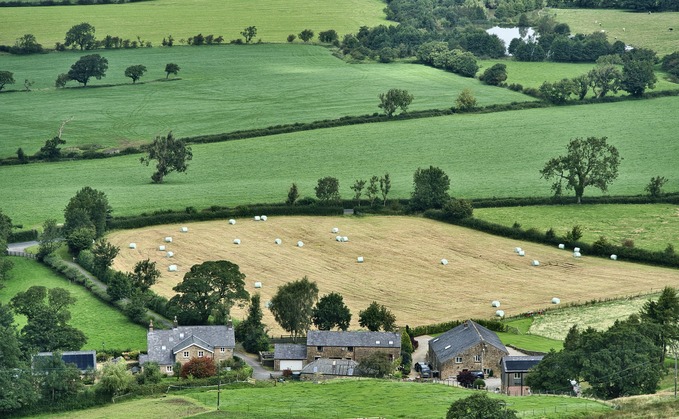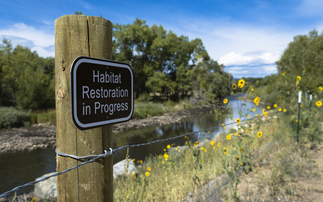Credit: Shutterstock
Conservation charity ZSL alongside the British Ecological Society argues changes to land use can bring benefits to climate, nature and people
Large-scale government-driven changes to land use across agriculture, housing and energy could restore biodiversity and tackle climate change while at the same time providing a "wealth of benefits" to people, a new report has claimed.
That is the headline recommendation of a new study published today by international conservation charity Zoological Society of London (ZSL) and the British Ecological Society (BES) which outlines both the benefits of a coordinated approach to transforming how land is used across the country as well as how this can be achieved at scale by the next UK government.
The report calls for an overhaul to the current approach to land management across government departments, highlighting that changes must be underpinned by commitments to decarbonisation, restoring biodiversity, and sustainable development.
It also highlights the need for investment in identifying and prioritising opportunities where land use can accommodate multiple goals, such as the inclusion of nature-friendly spaces in new housing developments.
"The land serves so many purposes for us, from defining, in part, our cultural identity to influencing our mental health and wellbeing through access to nature; from providing space for our homes to food for our tables; for its role in regulating air and water; and of course, for underpinning the livelihoods of many," said Professor Nathalie Pettorelli, the report's lead author and a researcher at ZSL's Institute of Zoology.
"But land is also a finite resource," she warned. "As we face the challenges of a rapidly changing climate, growing economic demands and declining biodiversity, land is a resource under increasing pressure. Our current approach of how we use and engage with nature is untenable; through an ambitious and integrated approach, we can build a more productive, sustainable, health-providing, just, wildlife-protecting and resilient economy."
The government had been set to publish a Land Use Framework for England earlier this year setting out its vision for how competing land use needs for farming, forestry, biodiversity, biofuels and more should be managed in the coming decades while supporting the delivery of the UK's climate targets. However, the long-awaited strategy has been repeatedly delayed, and with Parliament now having been dissolved ahead of next month's General Election, the plan's immediate future has been cast into uncertainty.
Today's report emphasises the need for ensuring action is driven by science and data, and calls for investment in efforts to monitor ecological, economic and social changes relating to land use in order to help build more reliable models to inform decision-making.
While such forecasting is commonplace in many areas of economics, such as for inflation, the report warns this level of attention and resources are currently lacking for models which integrate the economy with environment and climate.
Using the UK as a case study, the report authors examined the opportunities and challenges which can arise in developing a coordinated approach to land use that would allow governments to simultaneously tackle issues around food and energy security, housing, carbon emissions and biodiversity.
The report warns the UK is one of the most nature depleted countries in the world - where one-in-six species are at risk of being lost - which coupled with the degradation of natural ecosystems also has detrimental effects on the wider wellbeing of people through air and water pollution as well as heightened risks from the spread of disease.
Nature loss amplifies the strength and impacts of the climate crisis, it adds.
"Land, climate, nature and people are highly entwined," added Pettorelli. "With the upcoming UK general election, the incoming government has the opportunity to reshape land use and introduce the transformational changes needed to meet our national and international commitments on both nature recovery and climate change mitigation and adaptation."
The report stresses that nature can in most cases recover, but that it requires deeper thinking, difficult decisions and an overhaul in how land is used and managed. Integrating nature into environmental, social and economic policies is "key to building a healthier future for wildlife, people and the planet", it states.
Co-author of the report Matthew Gould, chief executive of ZSL similarly warned: "We don't have enough land to do everything we want to do."
"So we need to get smarter – we need an integrated approach, underpinned by science, where we look in the round at what we need, from food to housing to energy to nature," he added. "The Land Use Summit we hosted at ZSL showed the enthusiasm to work together towards a joined up, sustainable approach."
As the impacts of climate change grow, and with it increasing international tensions, the authors of the report stress there is a growing pressure to invest in decarbonisation, national security, and international action to ensure adequate protection of the world's most vulnerable countries.
With governments facing increasing challenges of reduced ability to financially meet the costs of tackling these challenges, the authors of the report urge that proper planning of land use is critical to building a more productive, sustainable, and resilient economy.
"The way we use land has to change – either because we make the choice now to build a more productive, sustainable and resilient economy, or because we will be forced to as the world around us continues to change," explained report co-author Professor Tim Benton, director of the Environment and Society Centre at Chatham House.
"These changes may come with a cost, but it is significantly less costly to act now than face the price of inaction – and by taking a holistic approach to transform our land use, we can build a future that benefits all."
You can now sign up to attend the fifth annual Net Zero Festival, which will be hosted by BusinessGreen on October 22-23 at the Business Design Centre in London.








